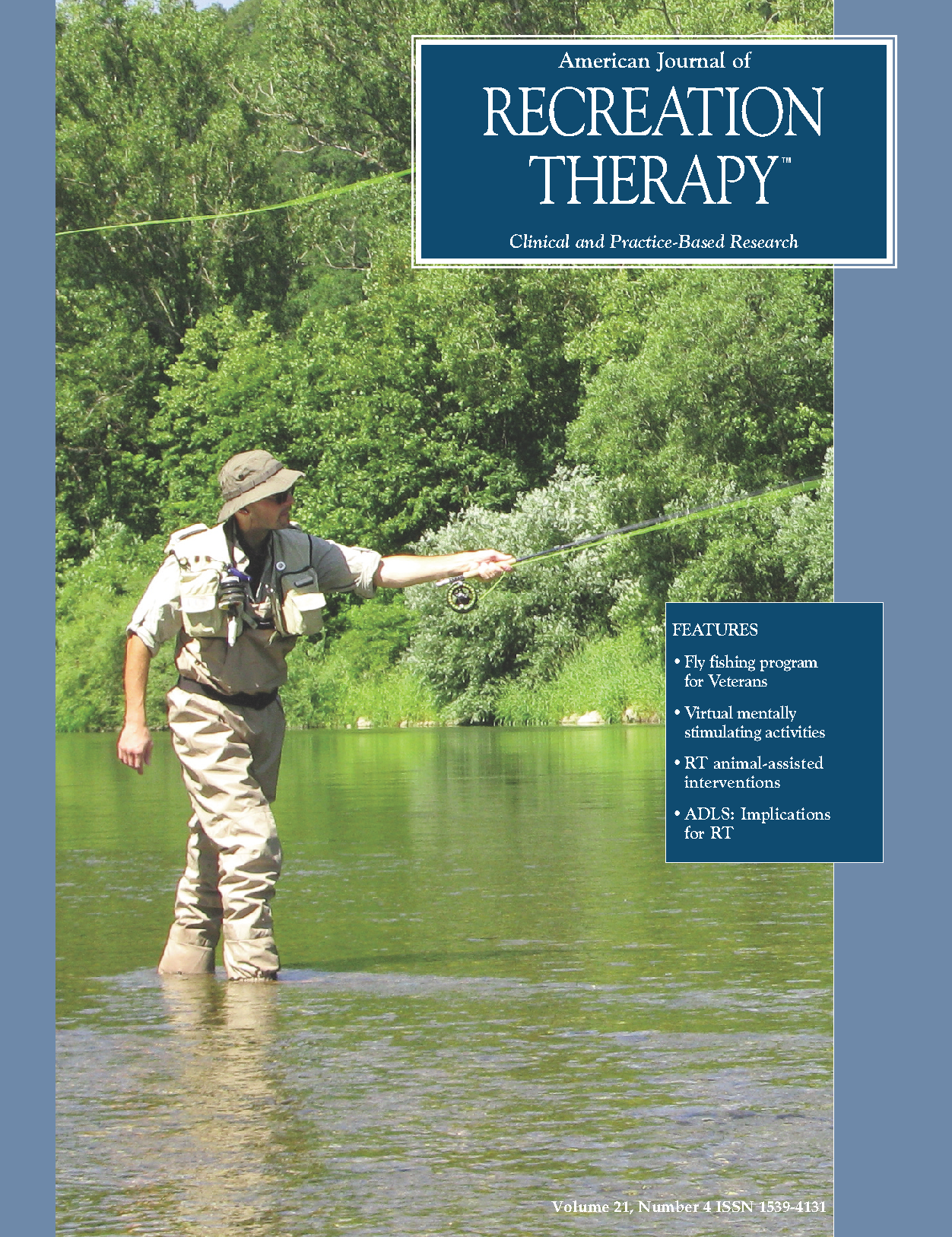The role of long-term participation in a fly-fishing program for veterans
DOI:
https://doi.org/10.5055/ajrt.2022.0269Keywords:
mental health, veterans, recreational therapy, fly-fishingAbstract
Objective: This study attempts to determine if long-term participation of veterans in a fly-fishing program, Project Healing Waters Fly Fishing Inc. (PHWFF), decreases post-traumatic stress disorder (PTSD), anxiety, depression, and perceived stress in its participants. Additionally, this study seeks to understand the benefits of this fly-fishing program. Design: This was a convergent parallel mixed-methods study.
Setting: The setting included participants from PHWFF.
Participants: There were a total of 117 participants from PHWFF in this study.
Measures: The measures in this study were the PTSD checklist: Military Version, the Generalized Anxiety Disorder-7, the Beck’s Depression Inventory, the Perceived Stress Scale, and one qualitative question.
Results: It was found that there were decreases in PTSD, anxiety, depression, and perceived stress, with stress being statistically significant (p < .05). In the analysis of the qualitative question, three themes were identified: a source of emotional and physical healing, companionship, and altruism.
Conclusions: A fly-fishing program can be a viable modality for alleviating combat-related trauma in veterans.
References
Committee to Evaluate the Department of Veterans Affairs Mental Health Services: Evaluation of the department of veterans affairs mental health services. 2018. Available at https://www.ncbi.nlm.nih.gov/books/NBK499497/. Accessed February 13, 2021.
Bureau Labor of Statistics: Employment situation of veterans-2019. 2020. Available at https://www.bls.gov/news.release/pdf/vet.pdf. Accessed February 13, 2021.
US Department of Veterans Affairs: Supporting veterans in the workplace: A course for employee assistance providers. Available at https://www.va.gov/vetsinworkplace/training/EAP/lesson04/04_003_hs01.htm#box1. Accessed February 2, 2021.
Reisman M: PTSD treatment for veterans: What’s working, what’s new, and what’s next. P T. 2016; 41(10): 623-634.
US Department of Veterans Affairs: PTSD: National center for PTSD. 2018. Available at https://www.ptsd.va.gov/understand/related/substance_abuse_vet.asp. Accessed February 13, 2021.
Novotney A: Stopping military and veteran suicides. 2020. Available at https://www.apa.org/monitor/2020/01/cecorner-suicide. Accessed February 13, 2021.
Castro AC, Kintzle S: Suicides in the military: The post-modern combat veteran and the hemingway effect. Curr Psychiatry Rep. 2014; 16(8): 460. DOI: 10.1007/s11920-014-0460-1.
Therapeutic Recreation Therapy: Subcommittee on health and recreation therapy and healing our wounded warriors. 2010. Available at https://www.recreationtherapy.com/history/va-history-6-8-10.htm#:~:text=Recreational%20therapy%20is%20an%20ideal%20component%20of%20the,healing%20the%20mental%20and%20physical%20wounds%20of%20war. Accessed July 15, 2022.
Veterans Affairs Vantage Point: Recreation therapy for veterans. 2017. Available at https://blogs.va.gov/VAntage/35237/recreation-therapy-creative-arts-therapyveterans/. Accessed July 15, 2022.
Vella E, Milligan B, Bennett J: Participation in outdoor recreation program predicts improved psychosocial wellbeing among veterans with post-traumatic stress disorder: A pilot study. Mil Med. 2013; 178(3): 254-260.
Bennett J, Piatt J, Van Puymbroeck M: Outcomes of a therapeutic fly-fishing program for veterans with combat-related disabilities: A community-based rehabilitation initiative. Community Ment Health J. 2017; 5(7): 756-765.
Bennett J, Puymbroeck M, Piatt J, et al.: Veterans’ perceptions of benefits and important program components of a therapeutic fly-fishing program. Ther Recreat J. 2014; 48(2): 169-187.
Craig PJ, Alger DM, Bennett JL, et al.: The transformative nature of fly-fishing for veterans and military personnel with posttraumatic stress disorder. Ther Recreat J. 2020; 54(2): 150-172. DOI: 10.18666/TRJ-2020-V54-I2-9965.
Ackerman CE: What is Kaplan’s attention restoration theory (ART). 2018. Available at https://positivepsychology.com/attention-restoration-theory/? Accessed July 12, 2022.
Gill C, Packer J, Ballantyne R: Applying attention restoration theory to understand and address clergy’s need to restore cognitive capacity. J Relig Health. 2018; 57(5): 1779-1792. DOI: 10.1007/s10943-018-0571-9.
Stiles K: Attention restoration theory and benefits of nature. Available at https://www.mindbodyvortex.com/attention-restoration-theory-benefits-nature/. Accessed July 12, 2022.
Thoits PA: Social support and psychological well-being: Theoretical possibilities (Chapter 10). In Sarason IG, Sarason BR (eds.): Social Support: Theory, Research and Applications. Dordrecht, NL: Springer, 1985: 51-72.
GlanzRimer BK, Viswanath K, Viswanath K: Health Behavior: Theory, Research, and Practice. 5th ed. San Francisco, CA: Jossey-Bass, 2015.
Towey S: Social support. Available at https://www.takingcharge.csh.umn.edu/social-support. Accessed July 12, 2022.
Wolters Kluwer Health: Giving support to others, not just receiving it, has beneficial effects. 2016. Available at https://www.sciencedaily.com/releases/2016/02/160211184959.htm. Accessed July 12, 2022.
Project Healing Waters Flyfishing Inc.: Looking for answers? Let’s start with the questions. 2020. Available at https://projecthealingwaters.org/about-us/faq/. Accessed February 14, 2021.
Demir SB, Pismek N: A convergent parallel mixed-methods study of controversial issues in social studies classes: A clash of ideologies. Educ Sci Theor Pract. 2018; 18(1): 119-149.
Wilkins KC, Lang AJ, Norman SB: Synthesis of the psychometric properties of the PTSD checklist (PCL) military, civilian, and specific versions. Depress Anxiety. 2011; 28(7): 596-606. DOI: 10.1002/da.20837.
PAR Staff: Administration and scoring of the generalized anxiety disorder-7 (GAD-7). 2020. Available at https://www.parinc.com/Portals/0/Webuploads/samplerpts/ChecKIT_Series_GAD7_Tech_Supp_Paper_v4_092920.pdf. Accessed July 14, 2021.
Kertz S, Bigda-Peyton J, Bjorgvinsson T: Validity of the generalized anxiety disorder-7 scale in an acute psychiatric sample. Clin Psychol Psychother. 2013; 20(5): 456-464. DOI: 10.1002/cpp.1802.
Spitzer RL, Kroenke K, Williams JBW, et al.: A brief measure for assessing generalized anxiety disorder. Arch Intern Med. 2006; 166: 1092-1097.
University of Wisconsin-Madison: Addiction Research Center: Beck depression inventory. Available at https://arc.psych.wisc.edu/self-report/beck-depression-inventory-bdi/. Accessed July 14, 2021.
Statistics Solutions: Beck depression inventory. 2021. Available at https://www.statisticssolutions.com/beckdepression-inventory-bdi/. Accessed March 17, 2021.
University of Wisconsin-Madison: Addiction Research Center: Perceived stress scale. Available at https://arc.psych.wisc.edu/self-report/perceived-stress-scale-pss/. Accessed July 14, 2021.
State of New Hampshire Employee Assistance Program: Perceived stress scale. Available at https://das.nh.gov/wellness/Docs/Percieved%20Stress%20Scale.pdf#:~:text=Individual%20scores%20on%20the%20PSS%20can%20range%20from,from%2027-40%20would%20be%20considered%20high%20perceived%20stress. Accessed July 14, 2021.
Baik SH, Fox RS, Mills SD, et al.: Reliability and validity of the perceived stress scale-10 in Hispanic Americans with English or Spanish language preference. J Health Psychol. 2019; 24(5): 628-639. DOI: 10.1177/1359105316684938.
Laerd Statistics: Multiple regression analysis using SPSS statistics. 2020. Available at https://statistics.laerd.com/spss-tutorials/multiple-regression-using-spss-statistics.php. Accessed July 5, 2022.
Braun V, Clarke V: Using thematic analysis in psychology. Qual Res Psych. 2006; 3(2): 77-101. DOI: 10.1191/1478088706qp063oa.
Downloads
Published
How to Cite
Issue
Section
License
Copyright 2000-2025, Weston Medical Publishing, LLC and American Journal of Recreation Therapy. All Rights Reserved.


